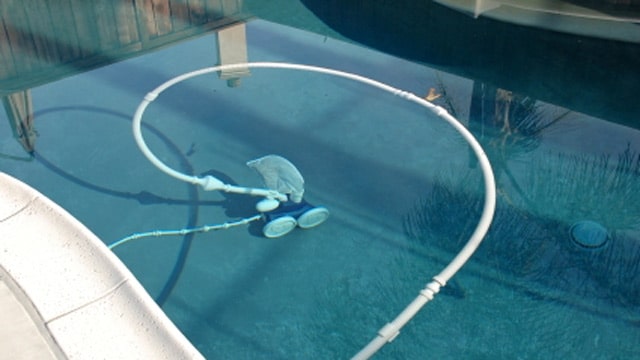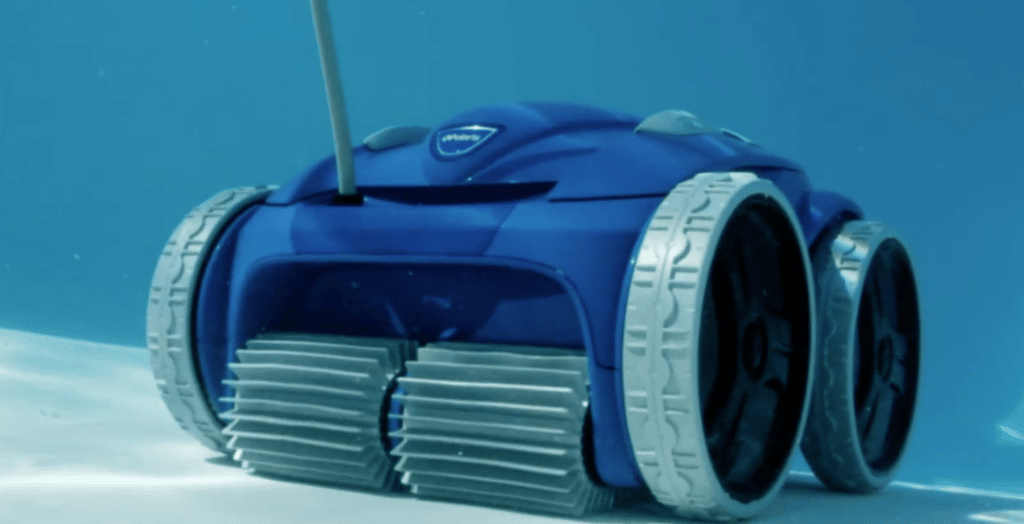Not all pools have the same needs and standards. As a pool owner, it is necessary for you to decide which robotic pool cleaner is suitable for your pool. There are a lot of brands out there, but one that stands out is Polaris ® which is known worldwide for its quality and best-in-class automatic pool cleaners.
However, before making any purchase, make sure to follow these tips on how to choose the best robotic pool cleaner. Also, reading robotic pool cleaner reviews on the top-performing robotic cleaners for swimming pool will help narrow down your choices.
IMAGE: POLARIS
1. What Type Of Pool Do You Have?
Based on how it’s built, pools come in the following types:
- Above ground. You can assemble this pool type by yourself. It usually has a simple shape and size, and are most commonly used by families. It is ideal to buy a robotic pool cleaner specializing in this pool type.
- Inground. This type has a solid foundation and made up of concrete. Your ground is dug up, and the pool is created within.
Finding a pool vacuum robot for above ground pools is easier since you only have a few choices in the market. On the other hand, you have to consider several factors when choosing one for an inground pool.
2. What’s The Purpose Of Your Pool?
Whether your pool is for commercial or residential use, understanding the kind of pool the pool vacuum robot will work on is vital. The residential type will suit any family backyard pool. If you own a swimming complex or those open to the public, it is recommended to choose a cordless robotic pool cleaner which can clean a wider area for longer periods.
3. What’s Your Pool’s Floor Type?
One of the most important factors you need to consider when on the market for a robot vacuum cleaner is pool floor type. Although there are machines that have the ability to clean pool floors that are not flat, make sure to determine if the brand or model you’re interested in is compatible or not to your pool’s floor type. There are also instances where a robotic pool cleaning machine does not operate on glass surfaces.
4. Know The Size And Amount Of Debris Falling On Your Pool.
Is your pool surrounded by a lot of trees? If yes, then your pool will have plenty of leaves floating on it, as well as twigs, flowers, acorns and other debris lying on your pool bed especially during fall. If this is the case, it’s best to buy a robotic pool vacuum that can not only handle debris underwater but can also rise above the surface and suck up floating leaves.
If your pool only has floating debris, get one that runs along your pool’s surface and at the same time capable of cleaning the pool bed. Some robot pool cleaners come with large filter bags which can accommodate more debris, while there are those that can collect bigger than usual debris.
5. Know Your Pool’s Dimension And Elements.
If your pool has inclines, slopes or steps, choose a robotic pool vacuum that’s capable of climbing inclines and steps. Avoid those models that do not climb steps or clean on corners that are more challenging.
If your pool is an above ground type, do not choose a robot pool cleaner that can vertically climb walls. Ensure that the walls of your pool are strong enough for the cleaning machine’s sucking power.
How Does A Robotic Pool Cleaner Work?
Robotic pool cleaners are automated cleaners that you don’t need to hook to the filtration system of your pool to run. You simply plug it in and let it do all the hard work for you. It will scrub the sides and bottom of your pool, as well as suck up calcium deposits and debris. This will decrease the algae growth in your pool and make it easier for you to maintain its pH level.
These convenient cleaning machines feature two various motors, each with its own function:
- Pump motor. This motor suctions water and sends it through the pool vacuum cleaner’s filter and propel it back into your pool.
- Drive motor. This is the one responsible for turning the device’s brushes and tracks.
There are some units that even come with a motherboard and sensors. This feature lets them detect walls which enable the cleaners to climb them or move in the other direction. They can also move in single or multiple directions
Features You Need To Be Aware Of
Before making any decision, here are some valuable and helpful features you need to look out for:
- Lightweight. It doesn’t matter how big or small a robotic pool cleaner is, what matters most is its weight. Getting a bigger machine if you have a bigger pool is a good idea, but make sure you will not have a hard time attending and carrying it by yourself from the storage to the pool.
- Wheels. Look for a unit with wide four-wheel-drive wheels made of rubber so that it can easily get around your pool and navigating it through bumps and slippery surfaces.
- Swivel cord. Since your pool cleaner will climb stairs, vertical walls, and move around your pool, its cord can get tangled easily. Tangles can be prevented with a swivel cord, and will also give your device the freedom of movement it needs to clean your pool’s surface thoroughly.
- Programmable timer. The best robotic pool cleaner features a programmable timer. So once you’ve set it up, you can leave it in your pool to do its job, and go about your daily routine.
- Brushes. Look for a cleaner with either rubber brushes that rotate or brushes with hard-bristle since they work well on almost all types of pool surface.
- Durability. Robotic pool cleaners are not cheap, so invest in one that’s made from materials of the utmost quality.
If you are interested in even more technology-related articles and information from us here at Bit Rebels, then we have a lot to choose from.


COMMENTS